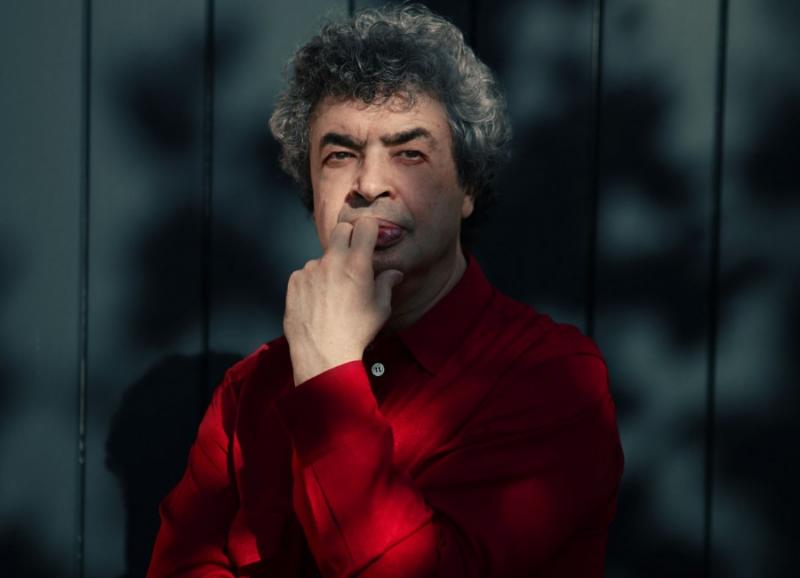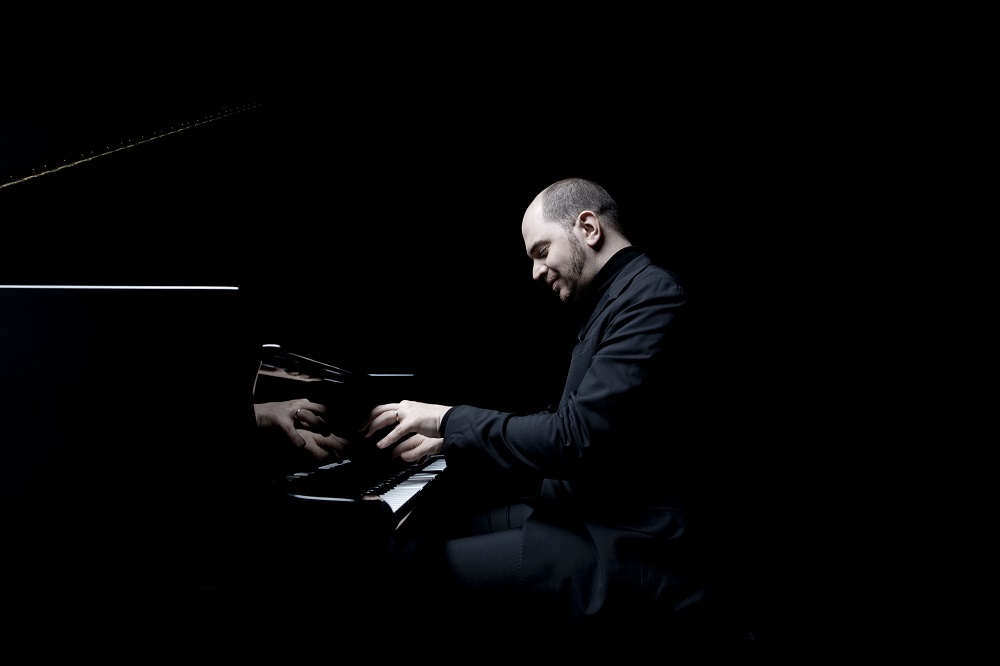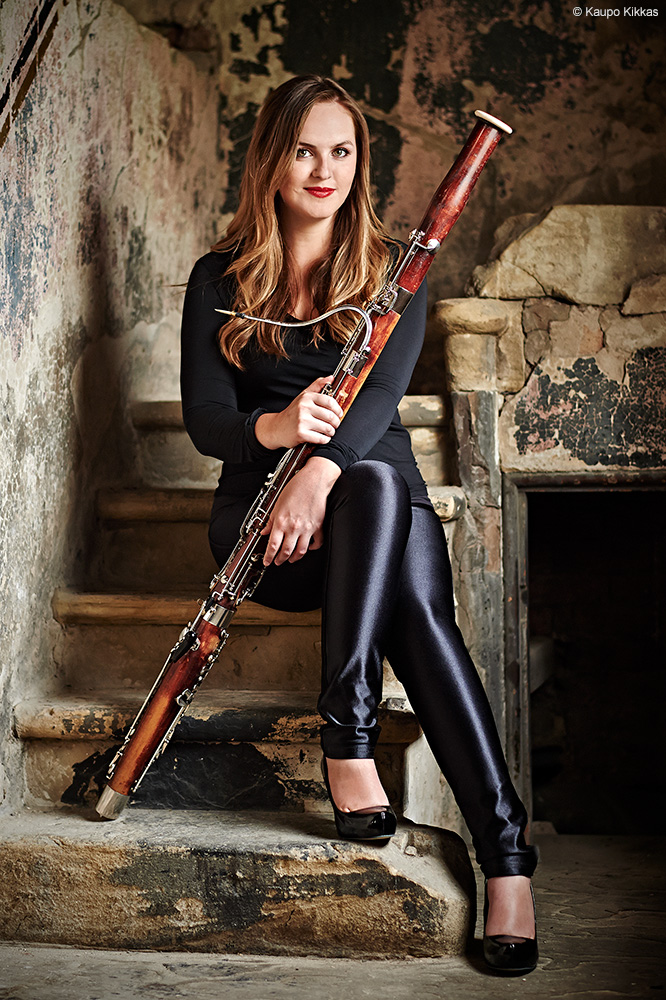Gerstein, BBC Symphony Chorus and Orchestra, Bychkov, Barbican | reviews, news & interviews
Gerstein, BBC Symphony Chorus and Orchestra, Bychkov, Barbican
Gerstein, BBC Symphony Chorus and Orchestra, Bychkov, Barbican
Final instalments of Tchaikovsky series go deep in the hands of a master conductor

What a relief to find Semyon Bychkov back on romantic terra firma after his slow-motion Mozart at the Royal Opera (performances speeded up somewhat, I'm told, after a sticky first night). On his own, dark-earth terms, there's no-one to touch him for nuanced phrasing, strength of purpose and the devoted responsiveness he wins from the BBC Symphony Orchestra - foot-stamping its approval at the end, a rarity - in Tchaikovsky and Rachmaninov.
The programming was ambitious and interesting, maybe not ideal in practice. Last night's twinning of death-haunted masterpieces, the Sixth, "Pathétique", Symphony following Rachmaninov's The Bells, might have seemed like a stunning combination as we head towards All Souls' Day; for this listener, the catharsis achieved by the magnificent "Choral Symphony" might have meant slightly less engagement after the interval with its very personal predecessor. Monday's mix of light and dark Tchaikovsky with a rarity, the Oresteia Concert Overture of Tchaikovsky's academic-genius pupil Taneyev, meant a lowering of inspiration; I'd have dropped the Taneyev and substituted for the fitfully interesting torso-movement of the so-called Third Piano Concerto the two amazing movements of the Concert Fantasia.
What I'd give to hear the fabulously clear and weighty sense of fantasy Kirill Gerstein (pictured below by Benjamin Ealovega) brings to Tchaikovsky's piano writing in that quirky structure. He certainly kept the Third's three contrasting ideas on the boil, even Gershwinising the improvisatory-sounding lyrical second theme (An American in Paris seemed to be foreshadowed) and sparkled in an all too short-lived Russian Gopak. But where does that overwrought long cadenza come from in such a context? Bearing in mind that this was the prototype movement for a Sixth Symphony before Tchaikovsky thought wisely and started again - though intriguingly also with bassoon colour at the beginning - the reworking into a fantasia for piano and orchestra deserves a more tailor-made chunk of solo-piano writing.
 At any rate Tchaikovsky's fertile imagination still seemed remarkable here, and even more so in Gerstein's magical unfolding of a rarity composed in the last year of Tchaikovsky's life, the Méditation from the Op. 72 set of 18 piano miniatures, alongside the laboured working of a dark "Fate" theme in Taneyev's response to Aeschylus. Only one fragment of orchestral colour stood out: solo violin (Giovanni Guzzo leading on Monday night) against sighing colleagues. And the Furies turn into Eumenides at the Athenian court too soon, namely halfway through the long overture for which Taneyev substituted a shorter prelude. This long peroration is fairly banal stuff, pre-Lloyd Webber placidity, though Bychkov encouraged the BBCSO brass and harps to make it gleam.
At any rate Tchaikovsky's fertile imagination still seemed remarkable here, and even more so in Gerstein's magical unfolding of a rarity composed in the last year of Tchaikovsky's life, the Méditation from the Op. 72 set of 18 piano miniatures, alongside the laboured working of a dark "Fate" theme in Taneyev's response to Aeschylus. Only one fragment of orchestral colour stood out: solo violin (Giovanni Guzzo leading on Monday night) against sighing colleagues. And the Furies turn into Eumenides at the Athenian court too soon, namely halfway through the long overture for which Taneyev substituted a shorter prelude. This long peroration is fairly banal stuff, pre-Lloyd Webber placidity, though Bychkov encouraged the BBCSO brass and harps to make it gleam.
The real thing followed, the whirlwind welter of Tchaikovsky's Francesca da Rimini framing what here sounded like the most poignant of all his love sequences, introduced by Richard Hosford's ineffable clarinet. It's certainly the most extended, and the cuts which used to be made in it seemed especially unfathomable when you had such beauties as the cellos giving an especially remote and magical sound to the theme with three-flute adornment. And you had to reel at the sheer depth and sheen of the string sound: principal conductors Jiří Bělohlávek and Sakari Oramo have put in the spade-work on which Bychkov was able to build to make this team sound like the best in London.
Until I heard what Bychkov could do with this searing tragedy at the end of the programme, I'd have been inclined to put the glorious Serenade for Strings in the second half. It can take two approaches: the chamber-orchestral light and bright, perfectly realised in a superb recent disc from the Russian Virtuosi of Europe, and symphonic scope, as here. Bychkov can justify that because of the sheer finesse in the phrasing, the wealth of lovely detail and the gorgeousness extracted from Tchaikovsky's typically amazing engagement of falling and rising scales. The Viennese-style waltz here and its 5/4 counterpart in the "Pathétique" may not have quite leapt balletically, but in true Bychkov style they glided with plenty of subtle rubato along the way.
There was so much to admire in what ought to have been the crowning glory of the series, the performance of the Sixth Symphony last night, that it seems curmudgeonly to admit that if the glitter and thunder of the great march-scherzo had all the adrenalin charge you expect, along with phenomenal detail, this listener remained unmoved. There's nothing to say that the final Adagio lamentoso should come straight on the heels of euphoric frenzy, but all the most shattering performances I've heard have done just that, with conductorly authority from the likes of Neeme Järvi and Vladimir Jurowski able to still the inevitable applause. Bychkov prefers to allow it and then mark a decent silence before plunging into the last rites, but it's harder to accept their world that way.
 Besides, all that earthiness is a bit too much in-your-face in the magnifying acoustics of the Barbican, though the sheer brilliance of sound from the trumpets and the thunder of the eight basses duly stunned. Best of all, perhaps, were the wind solos: Hosford again ranging from a reediness that cut through the unstinting fullness of sound Bychkov gets from the rest of the orchestra to the threshold of audibility before the first movement's central cataclysm, and amazing young Amy Harman (pictured right by Kaupo Kikkas), a bassoonist in a million, singing heartache rather than lugubrious gloom right at the start. I don't know by what dint of fortune this ex-Philharmonia player appeared in the BBC Symphony Orchestra, but I hope they can keep her to gild the lily of one of the world's best woodwind departments.
Besides, all that earthiness is a bit too much in-your-face in the magnifying acoustics of the Barbican, though the sheer brilliance of sound from the trumpets and the thunder of the eight basses duly stunned. Best of all, perhaps, were the wind solos: Hosford again ranging from a reediness that cut through the unstinting fullness of sound Bychkov gets from the rest of the orchestra to the threshold of audibility before the first movement's central cataclysm, and amazing young Amy Harman (pictured right by Kaupo Kikkas), a bassoonist in a million, singing heartache rather than lugubrious gloom right at the start. I don't know by what dint of fortune this ex-Philharmonia player appeared in the BBC Symphony Orchestra, but I hope they can keep her to gild the lily of one of the world's best woodwind departments.
It seems fair to end with a salute to the very best of the evening, Rachmaninov's fine-tuned response to hammy Edgar Allen Poe as refined by the translation of linguistic genius Konstantin Balmont. Perhaps the concert should have ended there, too, since the final move into A flat major light gives us a benediction Tchaikovsky's final moments - rather too rapidly pulsed last night - fail to provide. A performance by this orchestra in this hall - Bychkov's second, and finer - always throws me back emotionally to the last concert of Yevgeny Svetlanov with the BBCSO, two weeks before his death. Only Bychkov can come close for sheer teasing ecstasy in the "Wedding Bells" movement, gilded by a lyric-dramatic soprano in Emily Magee - the conductor's Empress in his magnificent Strauss Die Frau ohne Schatten at the Royal Opera - who kept luminous pitch in the relentless middle-to-upper register vocal line.
Constantly, though, you were thrown back to how both Rachmaninov and Bychkov prioritise the orchestra over the voices, though there was familiar expertise from tenor Vsevolod Grivnov in the opening sleighbell glitter and a superb debut from a handsome young Belarusian bass, Anatoli Sivko, feeling the mournfulness of impending death with heart and soul in the final movement. The BBC Symphony Chorus emphasised open vowel sounds - and open-mouthed keening, not humming, in the outer movements, which sounded wonderful - rather than giving us textural meaning, but that somehow felt right, too. And yes, here I did shed a tear or two as life ebbed away and strings sang the death-rhapsody to its final haven.
- Both concerts to be broadcast by BBC Radio 3 for future broadcast in Afternoon on 3
- Next BBC Symphony Orchestra concert featuring Brett Dean and more Rachmaninov on 1 November
- Read more classical reviews on theartsdesk
rating
Share this article
The future of Arts Journalism
You can stop theartsdesk.com closing!
We urgently need financing to survive. Our fundraising drive has thus far raised £49,000 but we need to reach £100,000 or we will be forced to close. Please contribute here: https://gofund.me/c3f6033d
And if you can forward this information to anyone who might assist, we’d be grateful.

Subscribe to theartsdesk.com
Thank you for continuing to read our work on theartsdesk.com. For unlimited access to every article in its entirety, including our archive of more than 15,000 pieces, we're asking for £5 per month or £40 per year. We feel it's a very good deal, and hope you do too.
To take a subscription now simply click here.
And if you're looking for that extra gift for a friend or family member, why not treat them to a theartsdesk.com gift subscription?
more Classical music
 Hallé John Adams festival, Bridgewater Hall / RNCM, Manchester review - standing ovations for today's music
From 1980 to 2025 with the West Coast’s pied piper and his eager following
Hallé John Adams festival, Bridgewater Hall / RNCM, Manchester review - standing ovations for today's music
From 1980 to 2025 with the West Coast’s pied piper and his eager following
 Kaploukhii, Greenwich Chamber Orchestra, Cutts, St James's Piccadilly review - promising young pianist
A robust and assertive Beethoven concerto suggests a player to follow
Kaploukhii, Greenwich Chamber Orchestra, Cutts, St James's Piccadilly review - promising young pianist
A robust and assertive Beethoven concerto suggests a player to follow
 Robin Holloway: Music's Odyssey review - lessons in composition
Broad and idiosyncratic survey of classical music is insightful but slightly indigestible
Robin Holloway: Music's Odyssey review - lessons in composition
Broad and idiosyncratic survey of classical music is insightful but slightly indigestible
 Classical CDs: Wolf-pelts, clowns and social realism
British ballet scores, 19th century cello works and contemporary piano etudes
Classical CDs: Wolf-pelts, clowns and social realism
British ballet scores, 19th century cello works and contemporary piano etudes
 Bizet in 150th anniversary year: rich and rare French offerings from Palazzetto Bru Zane
Specialists in French romantic music unveil a treasure trove both live and on disc
Bizet in 150th anniversary year: rich and rare French offerings from Palazzetto Bru Zane
Specialists in French romantic music unveil a treasure trove both live and on disc
 Scottish Chamber Orchestra, Ibragimova, Queen’s Hall, Edinburgh review - rarities, novelties and drumrolls
A pity the SCO didn't pick a better showcase for a shining guest artist
Scottish Chamber Orchestra, Ibragimova, Queen’s Hall, Edinburgh review - rarities, novelties and drumrolls
A pity the SCO didn't pick a better showcase for a shining guest artist
 Kilsby, Parkes, Sinfonia of London, Wilson, Barbican review - string things zing and sing in expert hands
British masterpieces for strings plus other-worldly tenor and horn - and a muscular rarity
Kilsby, Parkes, Sinfonia of London, Wilson, Barbican review - string things zing and sing in expert hands
British masterpieces for strings plus other-worldly tenor and horn - and a muscular rarity
 From Historical to Hip-Hop, Classically Black Music Festival, Kings Place review - a cluster of impressive stars for the future
From quasi-Mozartian elegance to the gritty humour of a kitchen inspection
From Historical to Hip-Hop, Classically Black Music Festival, Kings Place review - a cluster of impressive stars for the future
From quasi-Mozartian elegance to the gritty humour of a kitchen inspection
 Shibe, LSO, Adès, Barbican review - gaudy and glorious new music alongside serene Sibelius
Adès’s passion makes persuasive case for the music he loves, both new and old
Shibe, LSO, Adès, Barbican review - gaudy and glorious new music alongside serene Sibelius
Adès’s passion makes persuasive case for the music he loves, both new and old
 Anja Mittermüller, Richard Fu, Wigmore Hall review - a glorious hall debut
The Austrian mezzo shines - at the age of 22
Anja Mittermüller, Richard Fu, Wigmore Hall review - a glorious hall debut
The Austrian mezzo shines - at the age of 22
 First Person: clarinettist Oliver Pashley on the new horizons of The Hermes Experiment's latest album
Compositions by members of this unusual quartet feature for the first time
First Person: clarinettist Oliver Pashley on the new horizons of The Hermes Experiment's latest album
Compositions by members of this unusual quartet feature for the first time

Add comment